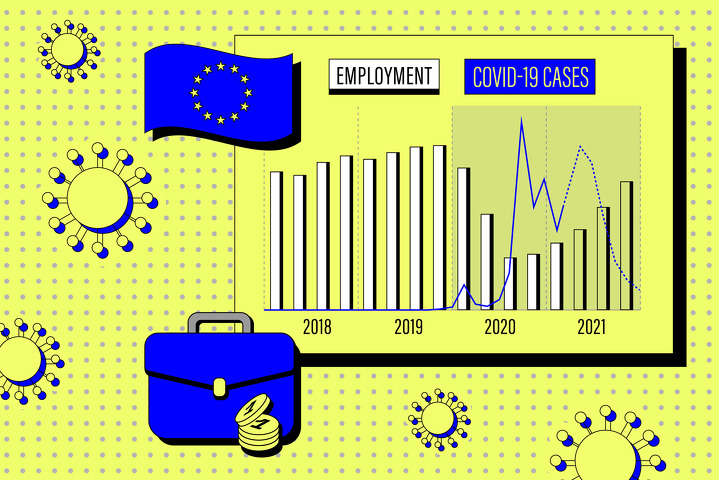Our invited speakers, Pavel HNÁT, Vice-dean for Academic Affairs at the Prague University of Economics and Business and Niclas POITIERS, Research Fellow at the Bruegel Institute in Brussels touched upon questions, e.g. the hardest-hit economic sectors and countries by COVID-19, the recent trade and labour market tendencies, and the latest measures and trends implemented by the European Union to tackle the crisis and to diminish its impacts.
Mr Hnát provided an overview about the hardest-hit economic sectors by the pandemic and he emphasised that among others, the COVID-19 has had a severe impact on tourism and industries that are connected to tourism, and also on business, arts, culture, education, logistics, transportation, industries, retail, and recreation. The speaker underlined that the current crisis is very different from those we have seen before and there is a general trend that it takes longer and longer, especially for the labour market, to recover from economic crises. Sectors can be affected for many years by the consequences of the current crisis.
Mr Poitiers pointed out that youth unemployment could become a serious concern as a result of COVID-19, and implemented measures in education, distance learning, and the psychological effects of isolation could also raise further challenges in the labour market in the long run. The speaker called attention to the differences between EU member states regarding the impacts of the pandemic and stressed that southern states, where entire regions depend heavily on tourism have been hit the worst by COVID-19 as cross-border movement was blocked or restricted. Mr Hnát highlighted the importance of differentiating between the short and long-term impacts of the crisis and also the fact that there can be many winners of the crisis in the long run if these sectors can survive in the short run. Industries that were not as important for our offline life but are critical for our online activities could experience immediate gains from the crisis. Among others, Mr Hnát emphasised cybersecurity, and the role of online assistance and online advisors. He underlined that those sectors that are ready for technological change could benefit from the current crisis.
Mr Hnát said that the impacts of the pandemic that we have experienced were predictable, however, COVID-19 is an amplifier of already existing weaknesses and vulnerabilities. He also pointed out the importance of resilient business models and strategies in this context. Mr Poitiers disagreed with Mr Hnát, underlining that not all consequences of the COVID-19 were foreseeable, and positive and negative surprises could be both mentioned.
Concerning the agricultural sector, according to Mr Hnát, the consequences of COVID-19 will not lead to self-supply in the long term as many countries cannot afford it and it would also undermine the idea of European integration and its role as a global actor. Regarding digitalisation, the speaker stressed that the Industry 4.0 changes many trends in the labour market, however, this is not a new phenomenon and the whole Industry 4.0 is about much more than just digitisation. He also mentioned that the industry can win over offshoring and cheap workforce, however, targeted investments are of crucial importance in this process. Mr Poitiers underlined some positive and negative impacts of automation, and also the fact that workforce in certain countries is extremely expensive (e.g. in Switzerland) and this is one of the main drivers of the shift towards automation.
Reflecting on the question that focussed on the most significant new roles and professions that emerged and/or may emerge in the future as a result of the coronavirus pandemic, Mr Hnát underlined the role of cybersecurity and the security sector in general. He said that recent developments can amplify market opportunities for businesses and fresh startups, and he also added, that even though automation and technology transformation are ongoing processes, not everything will be automated and humans will still be needed to operate robots. The speaker also said that new jobs will require efficient team relations, critical thinking, and good communication skills.
Regarding the EU measures as a consequence of COVID-19, Mr Hnát pointed out that we have seen the decreasing effectiveness of monetary policy in recent years and the decline of the capacity of central banks started decades ago. He also said that implemented tools and unconventional measures will most probably be effective in the short run as they can ease the current pressure, however, the question is what will happen in the long run. The risk of inflation is only one aspect that can pose significant challenges in the long term. Concerning the Next Generation EU Programme Mr Poitiers emphasised that the new tool is a significant opportunity for the member states, however, a lot depends on a country's ability and willingness to benefit from it and to effectively realise green transition-related projects. In this context, Mr Hnát highlighted the need for an adequate balance between green investments and projects related to other sectors.
Concerning the future economic perspectives, the speakers agreed that it is hard to foresee how long exactly will the recovery of Europe take, the return to pre-pandemic levels will most probably require years, while Mr Poitiers called attention to the risk of double recession when current economic support and targeted tools will once come to an end.
The event was moderated by Cecília Varsányi, International Relations Manager of the Antall József Knowledge Centre.
The event was realised with the support of the Prime Minister’s Office of Hungary and the Bethlen Gábor Foundation.

